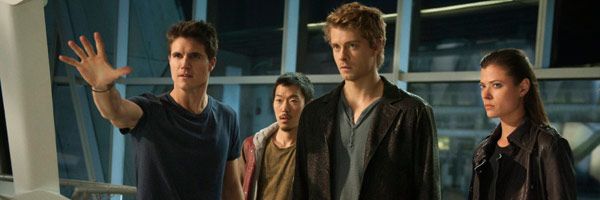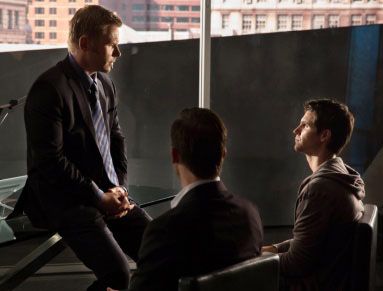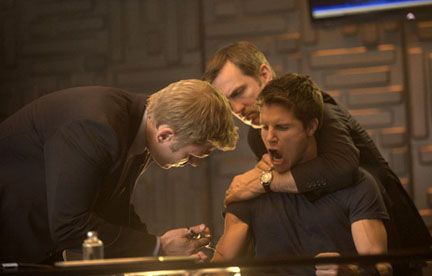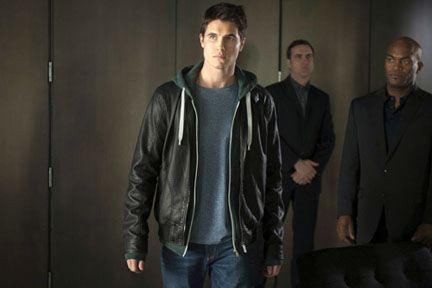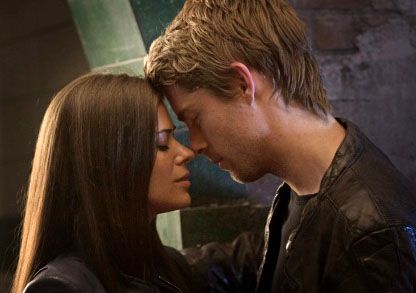The new CW drama series The Tomorrow People follows a generation of humans born with paranormal abilities, who are the next evolutionary leap of mankind. Up until a year ago, Stephen (Robbie Amell) was a “normal” teenager, but then he began hearing voices and teleporting in his sleep, never knowing where he might wake up. After learning that he is part of a genetically advanced race with the abilities of telekinesis, teleportation and telepathic communication, he also discovers that this race is being hunted down by a paramilitary group of scientists, known as Ultra and led by Dr. Jedikiah Price (Mark Pellegrino), and that the survival of everyone may just rely on him.
During this recent exclusive phone interview with Collider, executive producer Phil Klemmer talked about how this show evolved, how they’re taking inspiration from the original series, casting one of the original actors, the journey they’re looking to take with this season, what made Robbie Amell the right person to center the story around, and having a bad guy with a strong duality. Check out what he had to say after the jump, and be aware that there are some spoilers.
Collider: How did this show come about? Did you want to revive the original series, in some way?
PHIL KLEMMER: I was working on Greg Berlanti’s previous show, last year, called Political Animals. We were on a flight back from Philly, and we had talked about developing together. At a certain point, he was like, “Hey, have you seen The Tomorrow People?” I hadn’t, so I went back and watched old episodes on YouTube, but I couldn’t quite figure out what I was gonna do with it. I had all kinds of crazy sleep issues when I was a little kid, with sleepwalking, night terrors, insomnia, and all kinds of crazy shit. So, I was imagining a kid who just woke up on the top of a railway bridge and the cops would accuse him of being suicidal, and that he was convinced there had to be some explanation even though everyone thinks he’s crazy. To me, that was the fundamental frustration of adolescence. I thought there has to be an explanation that doesn’t end with the punchline, “You’re a freak.” I just found it so appealing that these people would come in and be like, “All right, here’s what’s going on. You’re actually super special. You’re one of us. Come away with us. You don’t have to live in the human world. All of your personal trauma has a silver bullet explanation for it. Not only that, you’re secretly better than everyone who persecutes you in your high school life.” That’s what you want to hear. Once I sunk my claws into that, I felt like I knew who Stephen was.
Is it entirely an advantage that the original series is not known too well here in the States, so that you can take inspiration from the original, but don’t have to treat it as gospel?
KLEMMER: It’s totally that way. I had one moment of doubt, when I had to call the original creator on the phone. I knew that he had seen our pilot, and I totally expected him to hate it because if he’d adapted something I had done 40 years ago, aside from not having been born, I would be pissed off. I’d have such a sense of propriety for what I had done. Maybe it’s because he’s such a futurist sci-fi guy, but he was able to be like, “No, it’s brilliant! I love it! It’s totally the contemporary version of my show.” It was so magnanimous and cool of the guy to just get on board and see it as its own creation.
How did you end up casting one of the original actors? Was that something you were looking to do?
KLEMMER: Definitely! Both Greg Berlanti and Julie Plec were huge The Tomorrow People nerds. Once we found out that Nicholas Young was not only interested, but has remained a big proponent of the original series, we were excited. He did his first day of work last Friday and, of course, we had to go up there to see him and get our pictures taken with him. He hasn’t made his living as an actor in the intervening years, but he walked onto our location and he did the scene, playing a perfect rumpled British man of science. He was just so lovable, and he was so excited. He had a million questions. It was clear that he had been thinking, his whole plane ride over from London, about backstory, and he had questions about his lines. You can’t be around that kind of enthusiasm and not be swept up in it.
Are you looking to include nods to the original series throughout the show?
KLEMMER: Yeah. One of our assignments for the staff writers on the show is to go and watch the entire The Tomorrow People oeuvre, for little shout-outs and Easter eggs. We don’t want it to be kitsch, so it’s always a challenge to figure out how you can innovate ideas from the original and make them feel fresh, and at the same time, not alienate people who haven’t seen it.
What can you say about the journey you’re taking with this season, and the big themes you’re looking to explore?
KLEMMER: It’s a coming of age story about a young man. There are a lot of questions about identity and generational struggles. It’s basically about progressivism, or regressivism. It’s a battle between homo-sapiens and homo-superiors. It’s something that really played out on our planet between us and the Neanderthals, 60,000 years ago. To me, it seems very real that we could be replaced by a genetic innovation on our design. The idea that this kid, Stephen, is put right at the intersection of these two species, and he’s being forced to choose a side, is a cool science fiction story, but it’s also a cool parable for growing up, whether you just do what your parents tell you to do and you be a good little boy, or you join the rebels and take the world for yourself. I find that really punk rock and empowering. As much as I love social media, video games and the internet, you have to just tell people of a certain generation, “You’ve gotta get off your ass and take control of the world.” Take a look around. It’s not headed to a particularly great ending, from where I stand. I really dig this show, as a call to arms for young people. But of course, they can start a revolution on their couch at 9 o’clock on Wednesdays on The CW.
What was it about Robbie Amell that made you see him as the person you wanted to center this show and story around?
KLEMMER: When he first came in, he came to read for John, the leader of The Tomorrow People, who’s a much more battle weathered guy, and he wasn’t quite there. I assumed that he was just too alpha to play a wounded teen, but he was able to capture that vulnerability, in a way that actually made me feel sorry for him despite the way he looks. That’s a real testament to his acting. I really felt like he was grappling with these issues of mental illness, and that he did feel like a pariah. Even though he’s a good looking, strapping young man, there’s something that’s identifiable in that adolescent rage and indignity of not knowing who you are and not knowing your history and not knowing what you’re supposed to do with your life.
What are you looking to do with Jedikiah and that adversarial relationship, this season?
KLEMMER: For me, every time Jedikiah gives a speech, the trick is that he doesn’t really say anything that’s wrong. All of his little logical things add up to a conclusion that’s diabolical and cruel, but bit by bit, it all makes sense. The idea that our bad guy is essentially the defender of humanity is something where, if this were real life, we’d all be cheering for Jedikiah. He’s trying to save our species. In the Anakin Skywalker paradigm, I did want The Emperor to make a play for this kid’s soul. I want there to be moments where you don’t know which way he’s going to break. Jedikiah makes some very valid points, and The Tomorrow People deceive Stephen. He could have his heart broken. He could rescue break-outs who could then do awful things in the world of human.
I just want to tell a story where you never know which side is going to triumph, and which side ought to triumph. What makes a hero a hero is that he or she has to decide for himself or herself. If it were as simple as just listening to John or listening to Jedikiah, there wouldn’t be anything left for Stephen to do. But, what’s so interesting about these stories is that they’re real moral quandaries. He, like all adolescents, will make tons and tons and tons of mistakes, except there are these incredibly elevated stakes when you’re doing them on a global scale and it’s a war between the species. You’re not just screwing up your own life. You’re screwing up the life of every human being on the planet. That’s what it feels like when you’re an adolescent. Everything you do feels like it’s got this crazy life-or-death decision.
Is it challenging to make this show look as good as it does, on a TV budget?
KLEMMER: It’s a crime that we’re able to do this for the money that we can do it for. I just can’t even fathom a $200 million movie. How could it be orders of magnitude bigger than this? It just looks so rich.
The Tomorrow People airs on Wednesday nights on The CW.

